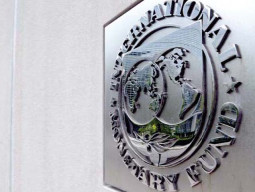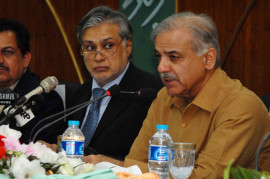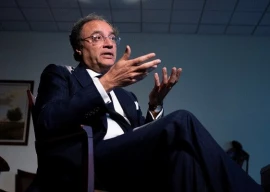
ISLAMABAD:
Pakistan has decried an assessment of the International Monetary Fund (IMF) that the rupee will fall about 14% within a year and has dismissed perception that the government has reached an agreement with the lender to let the currency depreciate.
Finance Minister Ishaq Dar chose on Monday a report launching ceremony on the state of economy by the Institute of Public Policy – a private policy think tank – to speak about the issue and soothe away jittery markets. He delivered a strong-worded message to what he called “pseudo intellectuals”.
“I am disappointed to come across comments and analysis by certain eminent economic experts that the rupee is bound to depreciate to 114 (to a dollar) as a result of some implicit understanding between the government of Pakistan and International Monetary Fund,” Dar said.
He said the issue of adjustment of rupee-dollar parity was not even discussed with the IMF. “Let me assure you that there is neither any explicit nor implicit understanding with the IMF on the devaluation of rupee,” he reiterated.
His comments came following release of an IMF report that said real effective exchange rate – a trade weighted average of trading countries – would depreciate by 7.7% in the current fiscal year 2013-14. In normal terms, the depreciation has been assessed at 14%.
Independent economists criticised the IMF assessment, saying it was not a good sign for the economy. In the interbank market, the rupee was trading at 105 to a dollar and after reports of “dictated devaluation”, the currency dipped in the open market.
“I am allergic to the words dictated devaluation.” The IMF’s currency assessment should not be taken for granted and a foregone conclusion, he said, adding in his views the “rupee was undervalued” due to speculators who were manipulating the market.
“I expect all professionals to be more responsible,” he said, cautioning that “pessimistic pseudo intellectuals will keep predicting that Pakistan will be a one-tranche country that will miss its key targets again.”
He asked all economists not to play politics with the IMF programme and talk as a one nation and on one policy.
Dar stressed that there was no better solution than going for an IMF programme to meet the country’s international debt obligations. Pakistan had to enter into the loan programme at a time when it was going through one of the most difficult economic phases in its history, he said.
The government successfully negotiated the loan facility with the IMF “without compromising an inch on national interest and the programme was agreed on the basis of a home-grown reform agenda, he said.
The government has formulated a Medium Term Budgetary Framework for 2013-16 to put the economy on a path of sustained growth. Under this framework, the goals are to enhance economic growth to around 7%, increase investment-to-GDP ratio to 20% and reduce fiscal deficit to 4% of GDP.
According to Dar, foreign exchange reserves of the country will be increased to around $20 billion and public debt will be reduced to 57.5% of GDP from existing 63.5%. The government will also reduce domestic borrowing and enhance development spending.
Published in The Express Tribune, September 10th, 2013.
Like Business on Facebook, follow @TribuneBiz on Twitter to stay informed and join in the conversation.
COMMENTS (9)
Comments are moderated and generally will be posted if they are on-topic and not abusive.
For more information, please see our Comments FAQ









































1713521455-0/Untitled-design-(9)1713521455-0-270x192.webp)






















i am not a economist but my analysis ,seeing the state of economy...Rupees wil go down to 150 by the end of 2014..
Are we suppose to buy this explanation? FX Markets are saying otherwise.
Imagine if one day there is a report in Newyork Times that USD has reached its record low value against PKR.
1 PKR = 103 USD
Pakistan is asking US to raise taxes or otherwise devalue its currency.
Oops! Someone pinch me! Even in the dream I am feeling stupid of myself!
This guy is an accountant, not an economist. If education was our priority 30 years back, this guy would not sit on this strategic post.
This is what happen when you try to tell a charter accountant about Rupee falls.
This article does not link to the source on IMF's site so I had to go looking myself. You can see the projected REER fall in the table at the bottom:
http://www.imf.org/external/np/sec/pr/2013/pr13322.htm
Note this was released on Sep 4. I am disappointed in the tribune for not writing about this earlier.
PML N can reject what ever they want but there before and after elections attitude and behaviour has made there hypocrisy revealed to every one..
The present US$ and Pak Rupee parity in the open market is: 1US$ = Pak Rupee 105.50.
If Ishaq Dar think Rupee will not fall down to 114 and these are the imagination of pseudo intellectuals then can Ishaq Dar make the Rupees stronger, lets say to bring the Rupee back to 60?
Can our leaders be trusted ?..............suggest ET take a quick poll.